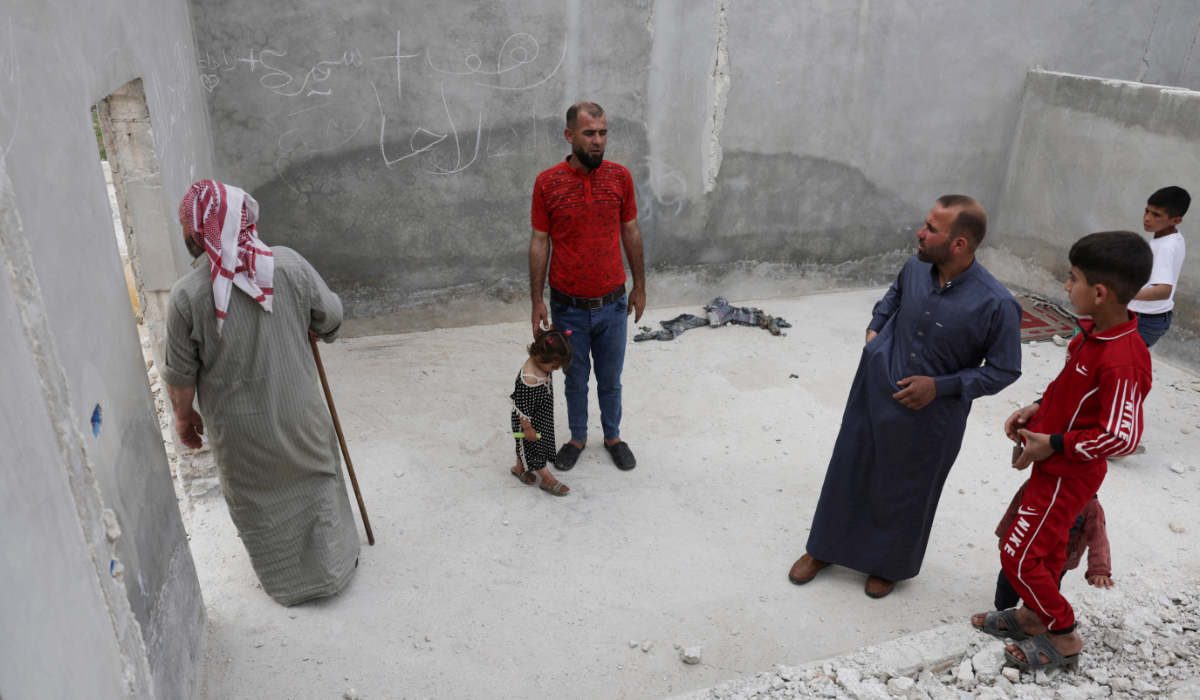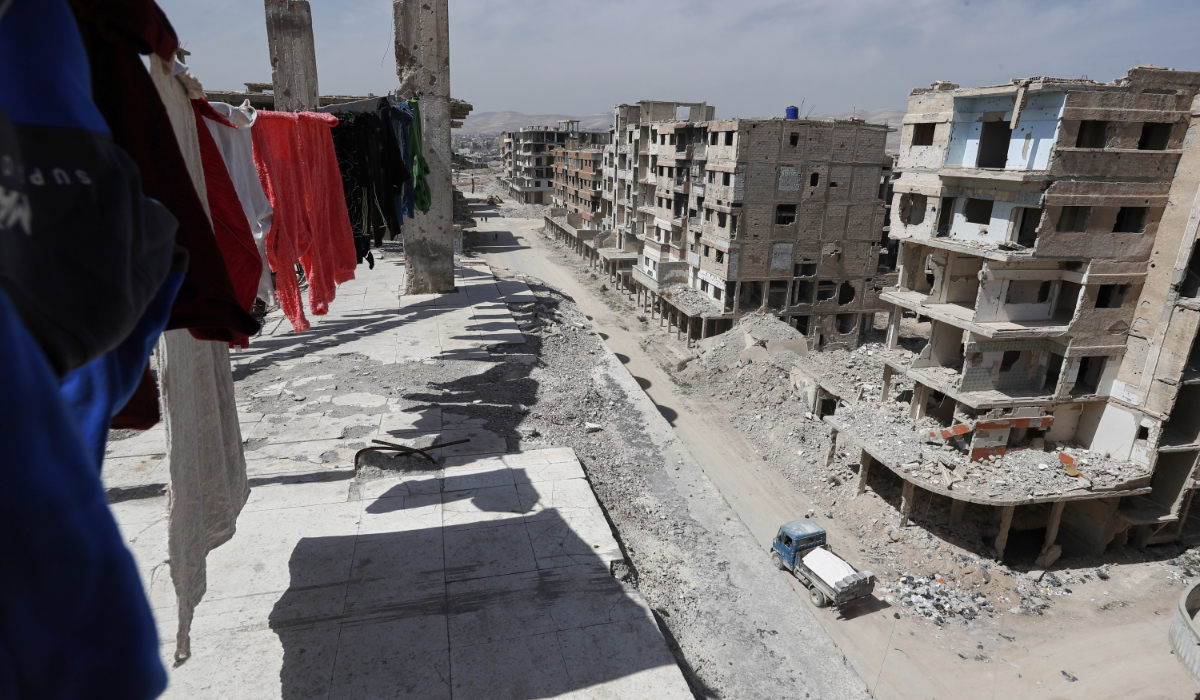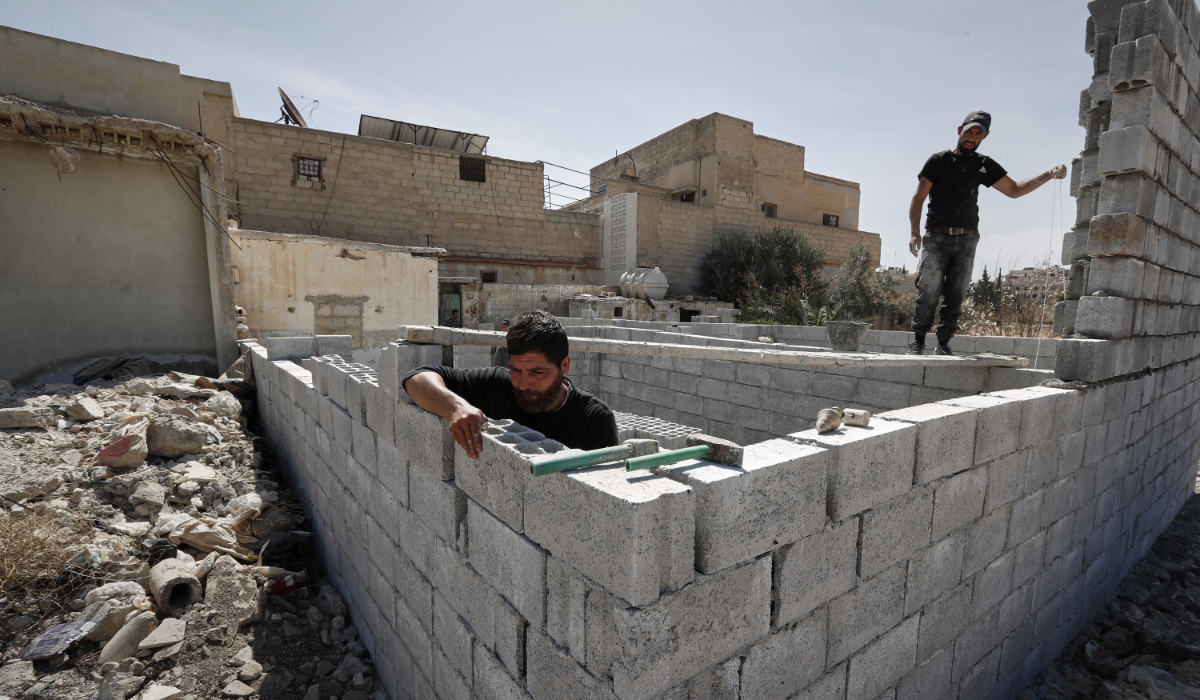DEIR AL-BALAH: Gaza’s bakeries will run out of flour for bread within a week, the UN says. Agencies have cut food distributions to families in half. Markets are empty of most vegetables. Many aid workers cannot move around because of Israeli bombardment.
For four weeks, Israel has shut off all sources of food, fuel, medicine and other supplies for the Gaza Strip’s population of more than 2 million Palestinians. It’s the longest blockade yet of Israel’s 17-month-old campaign against Hamas, with no sign of it ending.
Aid workers are stretching out the supplies they have but warn of a catastrophic surge in severe hunger and malnutrition. Eventually, food will run out completely if the flow of aid is not restored, because the war has destroyed almost all local food production in Gaza.
“We depend entirely on this aid box,” said Shorouq Shamlakh, a mother of three collecting her family’s monthly box of food from a UN distribution center in Jabaliya in northern Gaza. She and her children reduce their meals to make it last a month, she said. “If this closes, who else will provide us with food?”
The World Food Program said Thursday that its flour for bakeries is only enough to keep producing bread for 800,000 people a day until Tuesday and that its overall food supplies will last a maximum of two weeks. As a “last resort” once all other food is exhausted, it has emergency stocks of fortified nutritional biscuits for 415,000 people.
Fuel and medicine will last weeks longer before hitting zero. Hospitals are rationing antibiotics and painkillers. Aid groups are shifting limited fuel supplies between multiple needs, all indispensable — trucks to move aid, bakeries to make bread, wells and desalination plants to produce water, hospitals to keep machines running.
“We have to make impossible choices. Everything is needed,” said Clémence Lagouardat, the Gaza response leader for Oxfam International, speaking from Deir Al-Balah in central Gaza at a briefing Wednesday. “It’s extremely hard to prioritize.”
Compounding the problems, Israel resumed its military campaign on March 18 with bombardment that has killed hundreds of Palestinians, mostly women and children, according to health officials. It has hit humanitarian facilities, the UN says. New evacuation orders have forced more than 140,000 Palestinians to move yet again.
But Israel has not resumed the system for aid groups to notify the military of their movements to ensure they were not hit by bombardment, multiple aid workers said. As a result, various groups have stopped water deliveries, nutrition for malnourished children and other programs because it’s not safe for teams to move.
COGAT, the Israeli military body in charge of coordinating aid, said the system was halted during the ceasefire. Now it is implemented in some areas “in accordance with policy and operational assessments ... based on the situation on the ground,” COGAT said, without elaborating.
Rising prices leave food unaffordable
During the 42 days of ceasefire that began in mid-January, aid groups rushed in significant amounts of aid. Food also streamed into commercial markets.
But nothing has entered Gaza since Israel cut off that flow on March 2. Israel says the siege and renewed military campaign aim to force Hamas to accept changes in their agreed-on ceasefire deal and release more hostages.
Fresh produce is now rare in Gaza’s markets. Meat, chicken, potatoes, yogurt, eggs and fruits are completely gone, Palestinians say.
Prices for everything else have skyrocketed out of reach for many Palestinians. A kilo (2 pounds) of onions can cost the equivalent of $14, a kilo of tomatoes goes for $6, if they can be found. Cooking gas prices have spiraled as much as 30-fold, so families are back to scrounging for wood to make fires.
“It’s totally insane,” said Abeer Al-Aker, a teacher and mother of three in Gaza City. “No food, no services. … I believe that the famine has started again. ”
Families depend even more on aid
At the distribution center in Jabaliya, Rema Megat sorted through the food ration box for her family of 10: rice, lentils, a few cans of sardines, a half kilo of sugar, two packets of powdered milk.
“It’s not enough to last a month,” she said. “This kilo of rice will be used up in one go.”
The UN has cut its distribution of food rations in half to redirect more supplies to bakeries and free kitchens producing prepared meals, said Olga Cherevko, spokesperson for the UN humanitarian agency, known as OCHA.
The number of prepared meals has grown 25 percent to 940,000 meals a day, she said, and bakeries are churning out more bread. But that burns through supplies faster.
Once flour runs out soon, “there will be no bread production happening in a large part of Gaza,” said Gavin Kelleher, with the Norwegian Refugee Council.
UNRWA, the main UN agency for Palestinians, only has a few thousand food parcels left and enough flour for a few days, said Sam Rose, the agency’s acting director in Gaza.
Gaza Soup Kitchen, one of the main public kitchens, can’t get any meat or much produce, so they serve rice with canned vegetables, co-founder Hani Almadhoun said.
“There are a lot more people showing up, and they’re more desperate. So people are fighting for food,” he said.
Israel shows no sign of lifting the siege
The United States pressured Israel to let aid into Gaza at the beginning of the war in October 2023, after Israel imposed a blockade of about two weeks. This time, it has supported Israel’s policy.
Rights groups have called it a “starvation policy” that could be a war crime.
Israeli Foreign Minister Gideon Saar told a news conference Monday that “Israel is acting in accordance with international law.”
He accused Hamas of stealing aid and said Israel is not required to let in supplies if it will be diverted to combatants.
He gave no indication of whether the siege could be lifted but said Gaza had enough supplies, pointing to the aid that flowed in during the ceasefire.
Hunger and hopelessness are growing
Because its teams can’t coordinate movements with the military, Save the Children suspended programs providing nutrition to malnourished children, said Rachael Cummings, the group’s humanitarian response leader in Gaza.
“We are expecting an increase in the rate of malnutrition,” she said. “Not only children — adolescent girls, pregnant women.”
During the ceasefire, Save the Children was able to bring some 4,000 malnourished infants and children back to normal weight, said Alexandra Saif, the group’s head of humanitarian policy.
About 300 malnourished patients a day were coming into its clinic in Deir Al-Balah, she said. The numbers have plunged — to zero on some days — because patients are too afraid of bombardment, she said.
The multiple crises are intertwined. Malnutrition leaves kids vulnerable to pneumonia, diarrhea and other diseases. Lack of clean water and crowded conditions only spread more illnesses. Hospitals overwhelmed with the wounded can’t use their limited supplies on other patients.
Aid workers say not only Palestinians, but their own staff have begun to fall into despair.
“The world has lost its compass,” UNRWA’s Rose said. “There’s just a feeling here that anything could happen, and it still wouldn’t be enough for the world to say, this is enough.”
Gaza’s bakeries could shut down within a week under Israel’s blockade of all food and supplies
https://arab.news/p3mc4
Gaza’s bakeries could shut down within a week under Israel’s blockade of all food and supplies

- Aid groups are trying to stretch out what little supplies they have as Israel’s blockade of all food, medicine, fuel and other supplies into Gaza enters its fifth week
- Palestinians are crowding free kitchens for prepared meals, amid fears of a catastrophic rise in hunger


























